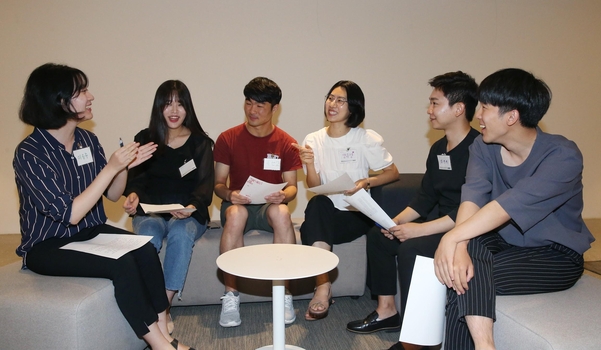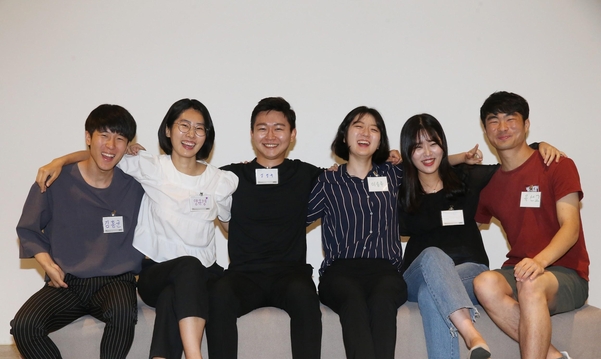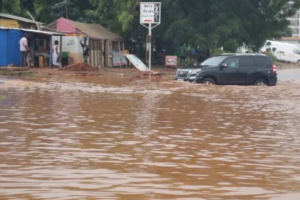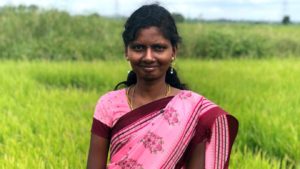Korean politics is one of taking sides. Let us not frame politics into simply ‘progressives and conservatives’.
We want a nation where adventurous students can grow along with model students.
Coding class is great but, instead of making it mandatory, students should be able to choose.
These days, it is widely said that people in their twenties are frustrated and angry about injustice. What do the youths think?
With the 100th anniversary of the Chosun Ilbo on March 5th 2020, six students in their twenties who participated in the Youth Future Expedition Team 100 – which sent one hundred students to countries around the world – sat down to discuss.
The Youth Future Expedition Team is now halfway through with 54 students having completed their journeys.
The six were: Hong Kyun Kim, 22, who experienced the young culture of American politics, Yoo Kyung Yang, 27, who met the Native Americans of Ecuador’s Amazon, Jung Ook Sung,27, who visited the unmanned autonomous ports in Rotterdam, Netherlands, Seung Joo Lee, 20, who explored Iceland where the government does not set minimum wage, Yoo Na Kim,21, who experienced the culture of respect towards the American soldiers, and lastlly Sun Kyo Ok, 23, who experienced Seattle’s computer education.
“DON’T JUST CAGE US UNDER THE FRAME OF FAIRNESS”
“In America, I met a student my age who was a member of the Democratic Party. But he had a best friend who was affiliated with the Republican Party. He says that they have become an inseparable pair since debating in middle school,” said Hong Kyun Kim.
When his group revealed their political preferences, they automatically got branded as a progressive or a conservative.
“Tactlessly bringing up a conversation about politics, you will either get an awkward silence or an angry divided crowd. As soon as those words come out of your mouth, they weave your entire life with your political ideology,” he said.
Yoo Na Kim supported this by saying, “Whether a progressive or a conservative, a person can have different opinions on different issues. I believe that it is incorrect to knock in a person’s identity by simply asking ‘Are you a Progressive?’ and automatically assuming, ‘Then you must be an activist’.”
Yoo Kyung Yang explained that she often felt that the older generation was trying to define them.
“Recently, I have come across many analysis on how people in their twenties are infuriated by the ‘unfair society’. Well… Will everything be solved as long as fairness is guaranteed?”
She continued by adding that she felt that the single word ‘fairness’ was being forced into a single frame.
“Sort of like ‘I’m following it so you should follow it too’ ? In reality, this is limiting. What kind of purpose would that serve? Politicians often speak of justice and fairness, while I want a society that guarantees diversity, creativity, and exploration,” she said.
“But since the politicians cannot ensure those values, it is like they are saying ‘let’s at least be fair’ and forcing our generation to follow that attitude.”
Seung Joo Lee agreed. She said that in today’s society, too many things are forced upon people.
She currently receives minimum wage in her part-time job. In Iceland, she added, the government does not set the minimum wage.
Instead, the companies and its workers freely and flexibly choose the wage amount.
On the other hand, the Korean government decides the minimum wage and even this becomes a political issue that creates a fissure in government between the assenting left and the dissenting right.
“And with these sort of automatic political definitions, it is difficult to have a proactive debate,” she said.
“WE WANT THE RIGHT OF CHOICE AND DIVERSITY”
“We want the right of choice and diversity”
Sun Kyo Ok flew to Seattle, USA, to explore their coding education site first hand.
She was surprised by the amount of choice that the students there enjoyed.
“I was most envious of the fact that middle school students could choose classes that they wanted to take,” she said.
From classes on the Korean language, English, Math, Social Studies, Science, or even Music, all Korean students are required to take same classes.
Thus, when she wanted to learn coding, it was impossible.
“So, I thought… the American system that encourages each student’s passion was a big takeway. Our country has suddenly incorporated mandatory coding lessons as the importance of computers increased. I believe that giving students a choice by saying ‘you can learn coding’ versus obligating students by saying ‘you must learn coding’ is completely different.”

Jung Ook Sung supported her statement and said,“I think that Korea lacks diversity as much as it lacks choice. In Rotterdam, Netherlands, ports that I visited, Samsung SDS, Netherland ABN AMRO Bank, and the Rotterdam Port Administration were all working together to research a blockchain based trading platform.”
They told Ook Sung that in their country, it was commonplace to share and discuss ideas, regardless of religion, belief, race, or gender.
“I thought that our generation could differentiate ourselves from the older generation by creating a culture where we can hear out all the diverse opinions of individuals,” he said.
Whilst in a thank you letter writing campaign for American war veterans, Kim, who participated, was approached by an American student and a Chinese student who talked to her about the Korean War.
“I was surprised. It was like a Korean and a Japanese students going to the historic Seodaemun Prison (Japanese colonial authority ran this prison to jail Korean independence fighters) together. While it is important to look back and analyse the painful past, I hope my generation can get along with everyone for a brighter future,” she said.
Instead of hostility or anger, OK wanted to have more positivity and ambition.
“A peer whom I met in Seattle had a college loan and a monthly rent close to a hundred dollars. Nonetheless, he confidently said ‘I am on my way to my future and I will repay all my loans’. I envied his spirit. I dream of a day when youths can have more diverse paths,” said OK.
He hopes not only for a country made only by model students, but one that explorers can be recognised as well.
KOREA IS THE BEST IN TERMS OF THE DYNAMIC DRIVING FORCE
Those who have travelled abroad through participating in the Youth Future Expedition Team 100 project stated that there were certain aspects where Korea was more advanced than others.
Ms Yoo Kyung Yang who travelled to Ecuador said that “Korea seems to be ahead of the pack in terms of its dynamic driving speed to get things done”.
“This can be illustrated by the Starbucks chains in Korea. As soon as the disposable products became an issue, they quickly replaced the plastic cups and straws with more eco-friendly products. I could truly feel it amidst of the slow moving life of South America.
That there indeed are side effects to the ‘quickly, quickly’ culture in Korea, but we are very good at absorbing and applying new systems,” she said.
Mr Hong Kyun Kim who travelled to the US, stated that the young generation there envied Korea’s convenient voting system.
“If you want to vote in the US, not only is the registering process very complicated, but also the voting day is not a holiday. With this voting system in place, I felt that Korean young people should further actively voice opinions through voting.”
Mr Jung Ook Sung who travelled to the Netherlands said, “While collecting information on my exploration and getting to know the local people, I thought that with our young people’s digital abilities, they could prosper anywhere in the word.”
He continued by adding, “The Youth Future Expedition Team 100 has given me the courage to start a trading startup company with a few of my friends.”
This story by Kim Asa was originally published by The Chosun Ilboo on September 12, 2019
BEHIND THE STORY
The Chosun-Ilbo initiated the ‘Youth Future Expedition Team 100’ project last March to provide young Korean people in their twenties with unlimited opportunities to explore all over the world while solving their curiosity and finding answers to our futures. The project aims to dispatch 100 young people, based on their proposals and plans, to all parts of the world where they believe the future is being shaped on an ongoing basis. The project is scheduled to be completed before March 2020, the Chosun-Ilbo’s 100th anniversary. The explorers will explore anywhere of 192 countries of six continents and meet whoever of 7.5 billion people on earth. The project will cover the entire world from the issue of the digital innovation led by Artificial Intelligence to African scientists studying the future of species, without limits on the regions and subjects. If you have further inquiries, please contact hundred@chosun.com. The website is future100.chosun.com. Click here for more information: http://news.chosun.com/national/future100/index.html .




